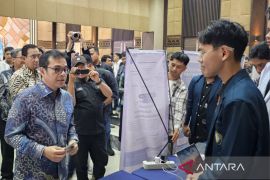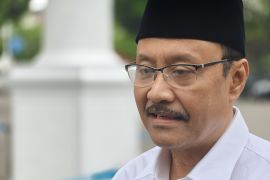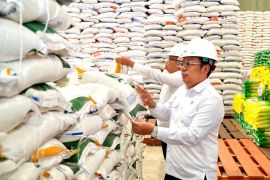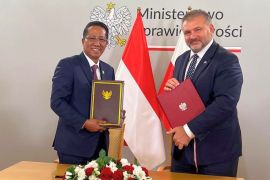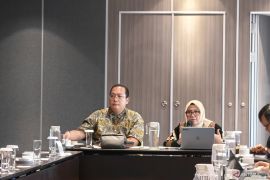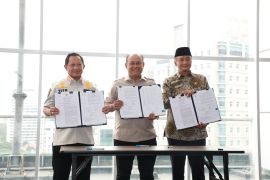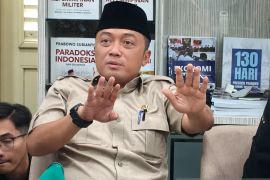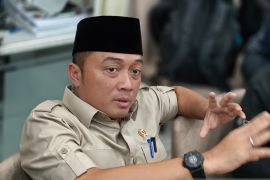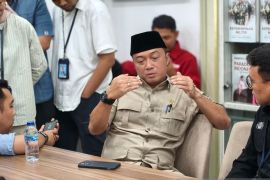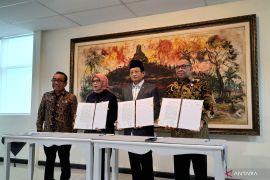Singapore ranked as one of Indonesia's top investors in 2013, with US$4.7 billion worth of investment in various sectors, ranging from infrastructure development to services.Jakarta (ANTARA News) - As immediate neighbors, Indonesia and Singapore fully realize that it is crucial to agree on border lines that geographically separating them, to prevent unnecessary territorial claim in the future.
Before his tenure ends on October 20, 2014, President Susilo Bambang Yudhoyono paid a three-day state visit to Singapore, from September 2 to 4, 2013, at the invitation of Singapore President Tony Tan Keng Yam.
He and Singapores Prime Minister Lee Hsien Loong, among other things, witnessed the signing of the Treaty on the Delimitation of the Territorial Seas of the Two Countries in the Eastern Part of the Strait of Singapore.
The Treaty was inked by Indonesias Foreign Affairs Minister Marty Natalegawa and his Singaporean counterpart K. Shanmugam.
This is the second maritime boundary agreement which Singapore has signed with Indonesia under President Yudhoyonos Administration. In 2009, the two countries signed the Treaty Relating to the Delimitation of the Territorial Seas of the Two Countries in the Western Part of the Strait of Singapore.
However, Indonesia still needs to negotiate other border issues with Singapore and Malaysia. Yudhoyono earlier expressed optimism that the negotiations with the two neighboring countries would proceed smoothly if its leaders were open minded on the issue.
The border towards the east of Singapore Strait includes the waters between Batam Island (Indonesia) and Changi (Singapore). To decide the border line, both Indonesia and Singapore used the United Nations Convention on the Law of the Sea, which was signed in 1982.
Yudhoyono, at a state banquet hosted by President Tony Tan on Sept. 3, 2014, said the agreement was new milestone in the bilateral relations and demonstrated how both countries have been able to work together in areas of mutual interest.
"In a world marked by tensions and disputes, with this treaty we are demonstrating that with strong political commitment it is possible to achieve mutually acceptable solutions. Through this agreement we set this new milestone in our bilateral relations," he stated.
President Tan expressed gratitude to Yudhoyono for under his leadership, the bilateral cooperation had expanded to include new areas and sectors.
"We have launched a new phase of our economic partnership through the establishment of dedicated working groups and enhanced our cooperation in the islands of Batam, Bintan and Karimun. We have concluded MOUs in areas such as diplomatic training, education and capacity building for public officials," Tan added.
Singapores Ministry of Foreign Affairs (MFA) said this latest treaty is a "demonstration of how Indonesia and Singapore have been able to work together in areas of mutual interest, and further underscores the excellent working relationship and bilateral ties between both countries".
Speaking to the press at Halim Perdanakusuma International Airport prior to departure to Singapore, Yudhoyono said the signing of the Treaty was "one of the achievements" between the two countries, saying that border negotiations between any two nations were "not an easy process".
Presidential Staff for International Relations Teuku Faizasyah recently explained about a long process that had included 10 meetings during the period of 2011-2014 before the two neighboring countries finally reached the deals.
The first meeting was held in Singapore on June 13-14, 2011 and the tenth meeting was in Medan on August 18-19 2014, Faizasyah said in a statement posted on the official website of the Cabinet Secretariat.
The maritime border line between Indonesia and Singapore in the eastern part of the Singapore Strait stretches along 5.1 nautical miles (9.5 kilometers), which is a continuation of sea border line in the center of Singapore Strait, as agreed in the Treaty of Sea Border Region in Singapore Strait signed in Jakarta on May 25, 1973, and the Treaty Of Sea Border Region in the West of Singapore Strait signed in Jakarta on March 10, 2009.
"The treaty will bring real benefits for Indonesia and Singapore in order to maintain sovereignty and enforce the sea law between both countries; to improve cooperation in the fields of shipping safety, maritime and fisheries; and also the cross-border crime mitigation in Singapore Strait," Faizasyah affirmed.
According to him, Indonesia has maritime borders with 10 countries, namely India (Continental Shelf, Exclusive Economic Zone), Thailand (Continental Shelf, Exclusive Economic Zone), Malaysia (Continental Shelf, Exclusive Economic Zone), Singapore (Sea Territory), Viet Nam (Continental Shelf, Exclusive Economic Zone), the Philippines (Continental Shelf, Exclusive Economic Zone), Palau (Continental Shelf, Exclusive Economic Zone), New Guinea (Continental Shelf, Exclusive Economic Zone), Timor Lest (Sea Territory, Continental Shelf, Exclusive Economic Zone) and Australia (Continental Shelf, Exclusive Economic Zone).
Of those borders, Indonesia has reached agreements on delimitation of territorial seas with India, Thailand, Malaysia, Singapore, Vietnam, the Philippines, New Guinea, and Australia, Faizasyah noted.
Main priority
President Yudhoyono said that since he was a minister under the Abdurrahman Wahid and Megawati administrations, he had understood well about the strategic value of Singapore for Indonesia.
"Over the past 10 years, sound bilateral relations with Singapore have become a main priority during my administration," he stated, adding that "Togetherness between Indonesia and Singapore in various forms must be maintained."
Yudhoyono was quoted as saying by the Jakarta Post that to combine both countries potentials - Indonesias potential economic growth and Singapores strengths as an economic center - a trade center and a service center "would bring real benefit for both Singapore and Indonesia".
Singapore ranked as one of Indonesia's top investors in 2013, with US$4.7 billion worth of investment in various sectors, ranging from infrastructure development to services.
The bilateral trade, meanwhile, stood at $74.8 billion, making Indonesia Singapores fourth-largest trading partner, the English daily said.
Regarding tourism, some three million Indonesian tourists visited Singapore and 1.5 million Singaporean tourists visited Indonesia in 2013.
Before returning to Jakarta, President Yudhoyono was awarded The Order of Temasek (First Class), Singapores highest honour for a foreign leader, by President Tan in a ceremony at the Istana attended by top ministers from both countries, on Sept. 3, 2014.
He was conferred the award "in recognition of his valuable contributions to regional cooperation and stability, as well as the substantial and vital friendship" between the neighbors.
"During his 10 years in office, President Yudhoyono consolidated Indonesian democracy, restored political stability, and fostered steady economic growth," said Ambassador-at-large Tommy Koh, who read the citation.
In response, Yudhoyono said: "I am very grateful and truly honored to receive the Order of Temasek First Class, which I dedicate to Indonesian people."(*)
Reporter: Fardah
Editor: Heru Purwanto
Copyright © ANTARA 2014

